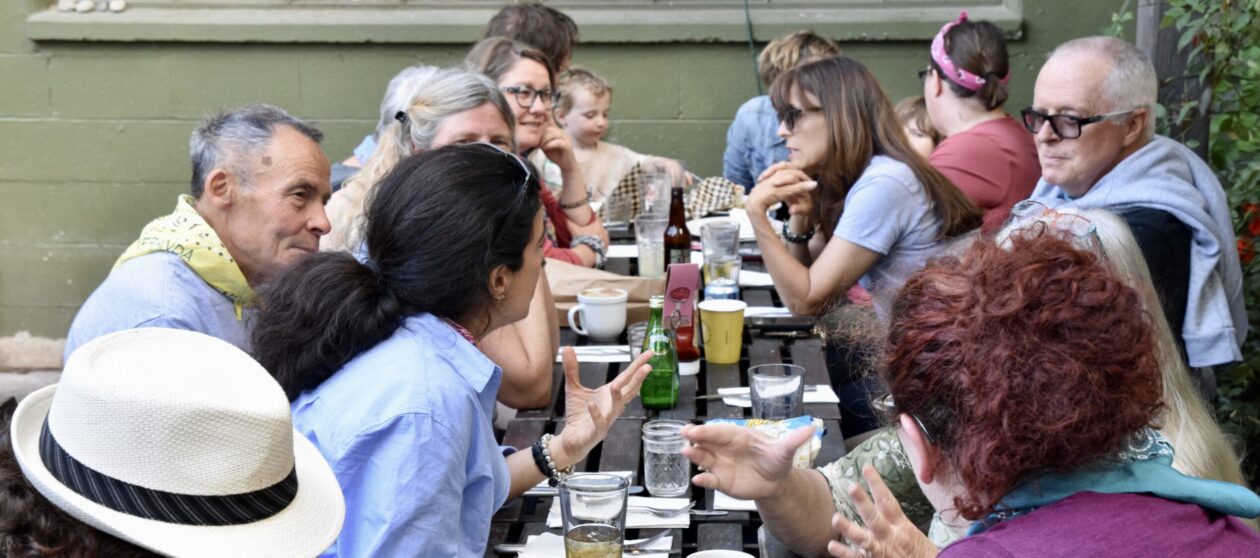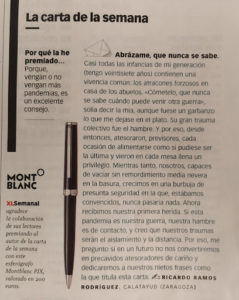This past weekend Argentina media was over-flooded by the news that the deaths due to COVID-19 reached 100.000. Today, 20th of July, we celebrate “Friendship Day” (Día del Amigo), and roughly one third of social media was taken by pictures of folks gathering as if nothing would be happening, another third taken by pictures of folks that were good friends to others and are no longer here due to the pandemic, and the remaining third by pictures of those who are madly missing gathering and hugging their friends.
I couldn’t help but thinking on this letter to the editor that I read last year. There is a reason behind the three attitudes that have filled up the social media here. “Our hunger is of contact”.
Letter to the editor from a Spanish 27 years old man: “Hug me tight, that you never know”
Any child of my generation has a common memory: being forcefully stuffed at your grandparents house. “Eat it, that you never know when another war may come”, my grandmother used to say, even when all had left in the plate was a single chickpea.
Her biggest collective trauma was hunger.
And because of that, since those times, treasured, providently, every occasion of feeding as if it could be the last one, and saw in each full table, a privilege.
Meanwhile, we, able to throw away half of a fridge in the garbage with no regret, grew up in a bubble of presumed safety, convinced that nothing would happen.
Now we get our first wound.
Yes. This pandemic is our war, our hunger is of contact, and I believe that our trauma will be isolation and distance. That is why I wonder if in the future, we would not become in provident treasurers of affection and will tell our grandchildren phrases like the tittle of this letter: “Hug me tight, that you never know”
(Ricardo Ramos Rodríguez, Zaragoza)
HLT Loves,
Cris


Wonderful Cris,
This letter certainly hits so very close to home for me, with immediate connectivity to my Mother. She also grew up in a time of, in not actual immediate hunger, the clear threat that hunger was not ever far away. For her, to “waste food” was an actual sin, not just a perceived one. It’s how my siblings and I grew up as well, even though there never was any actual or perceived threat of “hunger”. We ate well always. Simple, yes, and maybe even a little repetitive and monotonous, but always in ample and healthy quantities.
The “final” hunger imposed on her was the one referred to in your enclosed editorial letter. The hunger for closeness, of contact, of hugs and embraces and fond kisses. Her final months were in the enforced confinement of a pandemic derived isolation. The physical “imprisonment” was exacerbated by the inability of her understanding of the “Why?” of it. Why are you all standing outside my window? I can’t hear you or touch you. Why don’t you come inside and sit by me and talk to me. Why are you treating me like this? Her worst fears of hunger as a child were never as personal and as painful as these last days of her life. Not until literally her “Last Days” of Hospice care could we touch her nearly lifeless hands, and stroke her hair and whisper the endearments we had been kept from for nearly a year. For us, her children and grandchildren this was the chapter that has instilled in us the heart of war we never dreamed of having to fight. “Hug me tight, that you may never know”.
Bless you Cris, and all CaminoHeads,
SF,
PFJ
Dear PFJ,
I had to read your comment in parts, because it was very very touching… When I was posting this letter, I was thinking that I could have posted any of those pictures from the Veranda where you were hugging each of us. Or any of the pictures you post with your grandchildren. Or your friends. You are a hugger. And if there is anything that you, for sure, will never regret is having missed giving a hug… a HUGE hug.
Remember that post when we talked about how is that we live after we die? We were saying that in a way, those who die stay with us every time we bring them back with a memory. Imagine that? How cool is to leave in all of those we love the imprint of a HUGE hug… such that once we no longer be here, they will bring us back hugging them…
Looking forward to getting more hugs from you!
HTL as Ron says!
Cris
Ah, an excellent story to begin my day here in Spain.
When this ‘war’ first started, having no idea that it would go on even this long, I had the feeling that the restrictions limiting personal contact enjoyed by Spanish people (kisses as a common greeting, for example) would contribute to mental health issues apart from, and potentially longer lasting than, the virus particle itself.
But from my vantage point as a new-comer to this community in northern Spain, I have observed wonderful resilience and great community responsibility despite many deaths and infections. Many businesses have closed, and recently a few new ones have opened, people here do respect mask use and personal spacing and hand cleaning upon entry to businesses, and perhaps most important, I think I can see smiles underneath those masks.
So I hope that you too are smiling under that mask and that your smile encourages others to ‘Carry On’ even if there is a ‘war’ going on.
Cris signed off with HTL. Do you know what HTL means, at least to me? Hug Too Long, that kind of contact that is long enough to release some magic things in our bodies that overcomes physical and emotional pain, brings a flow of warm memories and makes one want to do it again.
HTL loves,
Ronaldo
Querido Ron,
I am your fan. You know that, right?!!! If there is something I love from your posts is the way you describe things that others (most of us) see as “normal”. The way you describe them makes them “extraordinary”. I am soooooooooo looking forward to ones of yours HTL!!! (and Anne’s too!!!!!!!!)
A(los)brazos,
Cris
Yes sorry to hear about Argentina and the coronavirus but I suppose it’s nowhere near Brazil’s terrible death rate which I think is one of the highest on Earth beaten only by the USA.Even India is less than Brazil.Modi in India despite his many faults has gotten a grip on the situation but the leader of Brazil doesn’t seem to care much like the ex leader of the USA.I notice Columbia is very high too and second after Brazil in South America.I don’t know much about Colombia although bits of it’s turbulent and bloody history is coming back into my conciousness.
Dear Kevan,
Thank you for your sentiments. You are totally true… The death rate from the virus is astronomic in every country… no matter what… I guess, to us, 100.000 resonates so harshly because one of the most tragic facts in Argentinian recent history is the missing people during the dictatorships… 33.000 missing. When this number is compared to the pandemic, it not only shows the impact of the pandemic, but the impact of the dictatorship too. All very sensitive.
And you are totally spot on with regards to Brazil. Argentina and Brazil have always been very close, while we maintain too a love and hate relationship mostly due to football!!!! But Brazil is a country Argentinian love and viceversa, so it is truly painful to see what they are going through. I have a Brazilian adoptive family; and my Brazilian adoptive father, now retired, was the head of the highest criminal court in Sao Paulo state, and he says often that no criminal has done a crime of the magnitude of the one this man in the presidency has done with the pandemic…
I have never been in Colombia… but I love Gabriel Garcia Marquez… you may enjoy his book “News of a kidnapping”, which tells a bit part of their also bloody story.
Another great book to learn about Latin America is “The open veins of Latin America” by Eduardo Galeano.
Hugs across the pond!
Cris
Thank you, Cris, for all you do for this family and for being my fan.
I am grateful for the chance to take words from my mind through my fingers and onto paper (or screens) and share them with others. In the last few years since I walked the Camino I have a different view of language. Really, it is a clarification that what I was thinking about my first language, English, was likely true of all languages. The many languages heard along the Camino brought that home for me.
And since I am focused on what makes us the same rather than what makes us different, things like laughter, a pause with raised eyebrows, or just looking down at ones feet to avoid eye contact with someone we feel uncomfortable being with are universal regardless if I understand the other person’s spoken message or not.
But the other universal is that almost every word has connotations and too often we don’t know what the word uttered from our mouths means once it hits the brain of other earthlings. There is much discussion of the word ‘NO’ and it only has two letters and one definition for most of us. So I find it hard to put into words some concepts that others may misunderstand. So sharing a table helps end the war, we all need to spend more time at the table together. And hugs, of course, before and after that experience.
I overlooked Peru it has 127k dead similar to Colombia and more than Argentina.All the rest like Chile, Bolivia,etc are a lot less.I always thought that Brazil might be a bit cut off from the rest of South America as it’s not Spanish speaking.It is very hard to get by there if you can’t speak Portuguese when talking to people but reading things isn’t that difficult after studying signs since English is an Indo European language like Portuguese and many words are in common.Although Portuguese is a romance language and English a Germanic language the invasion of England in 1066 by the French infused English with a lot of French words up to 35 percent of them to it gives a much greater insight into the romance languages than say other Germanic languages like German or Swedish would have.They say that had the pre 1066 English was very similar to Dutch so Suriname would be the place to head for in South America!
I love this, Kevan!!!
I learn sooo much from you!
Yes the closet language to English is Friesian, and my sister is trying to learn it! although as we can speak Afrikaans it should be a good stepping stone! Friesian is a minority language and spoken in the Friesian Archipelago off the coast of The Netherlands, Germany and Denmark and is very close to Old English but modern English because of the French in it is no longer mutually intelligible with Friesian infact it’s not mutually intelligible with Old English ! Dutch is a bit more similar to German than Friesian so effectively it’s a transitional language between English and Dutch.